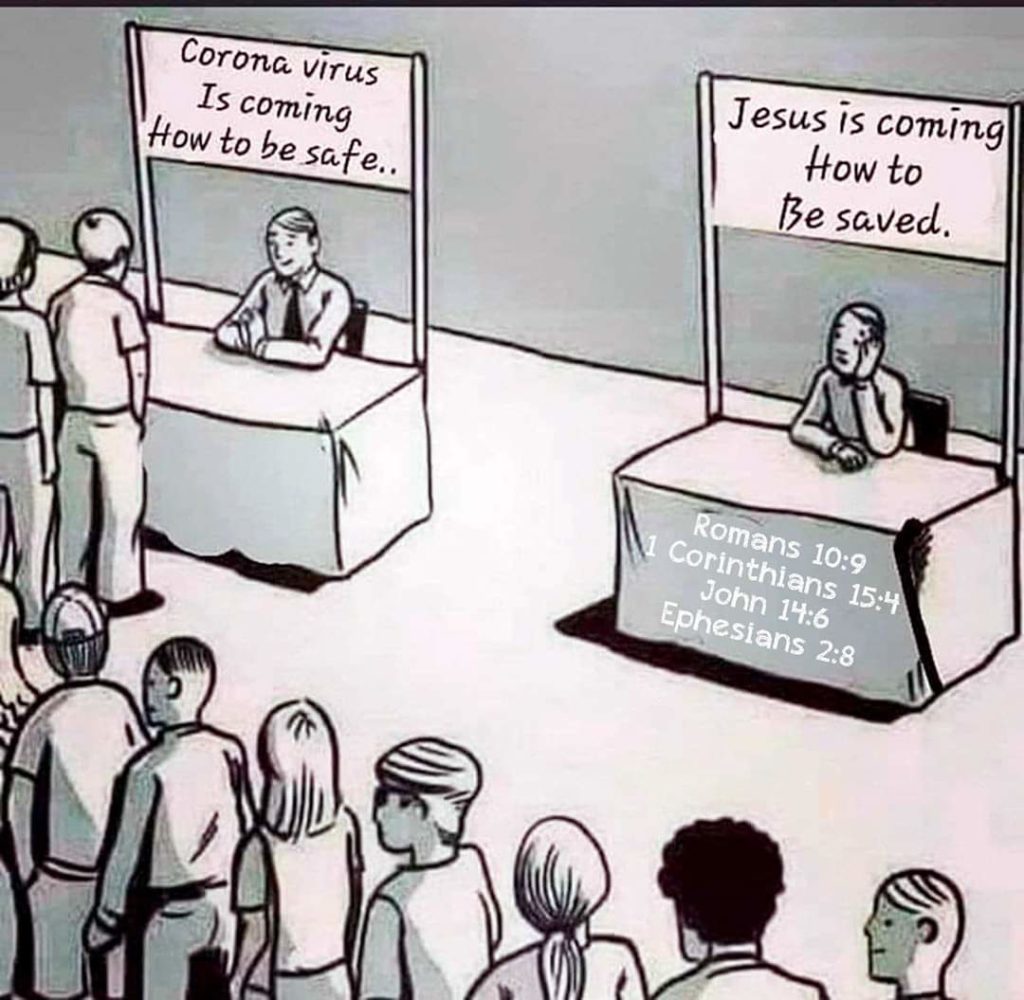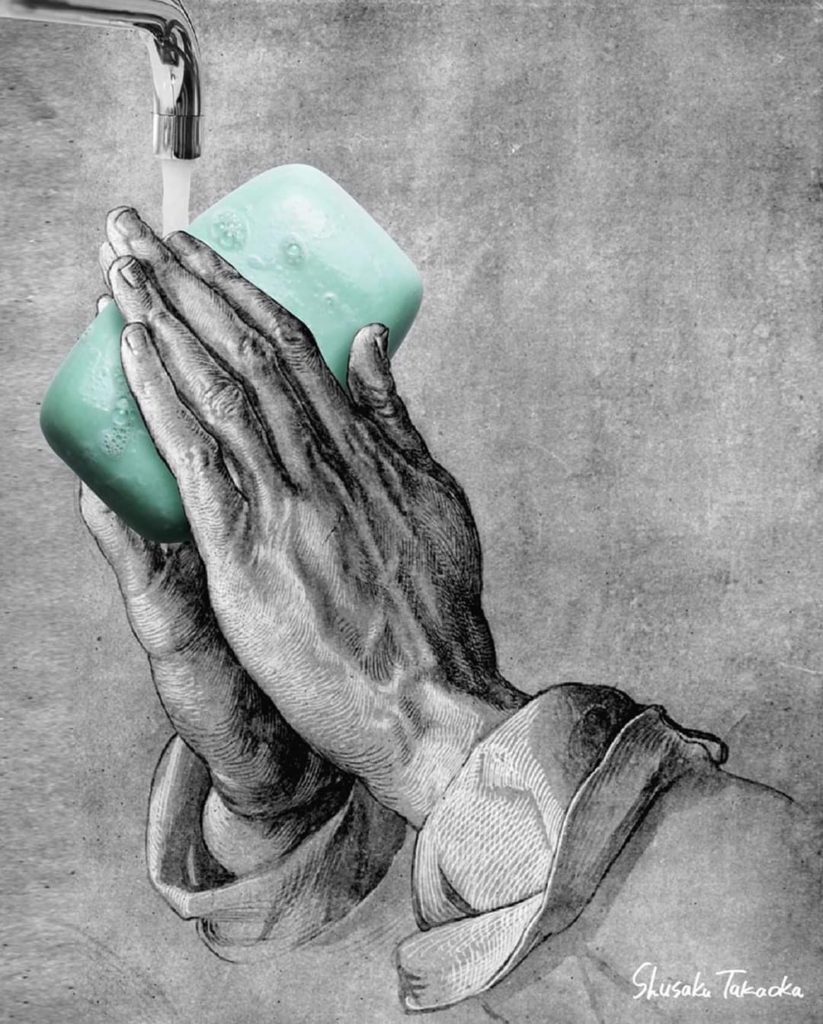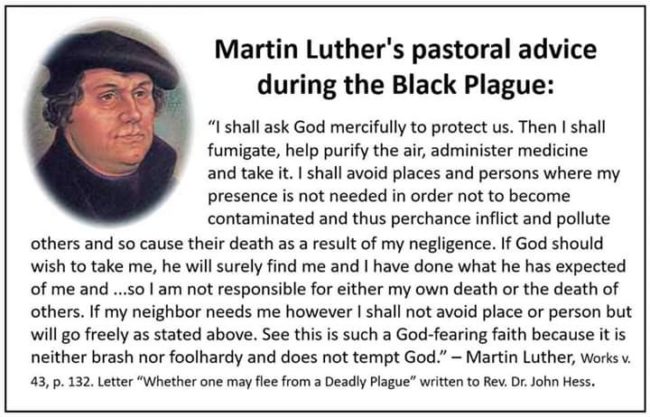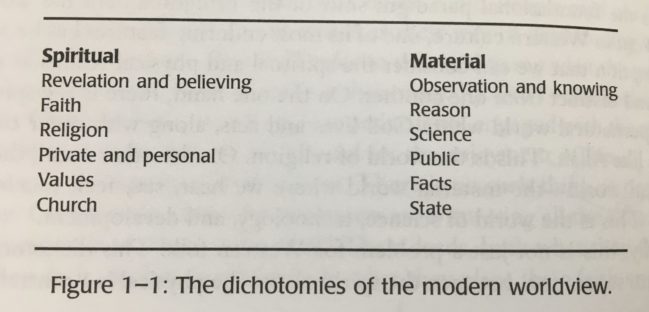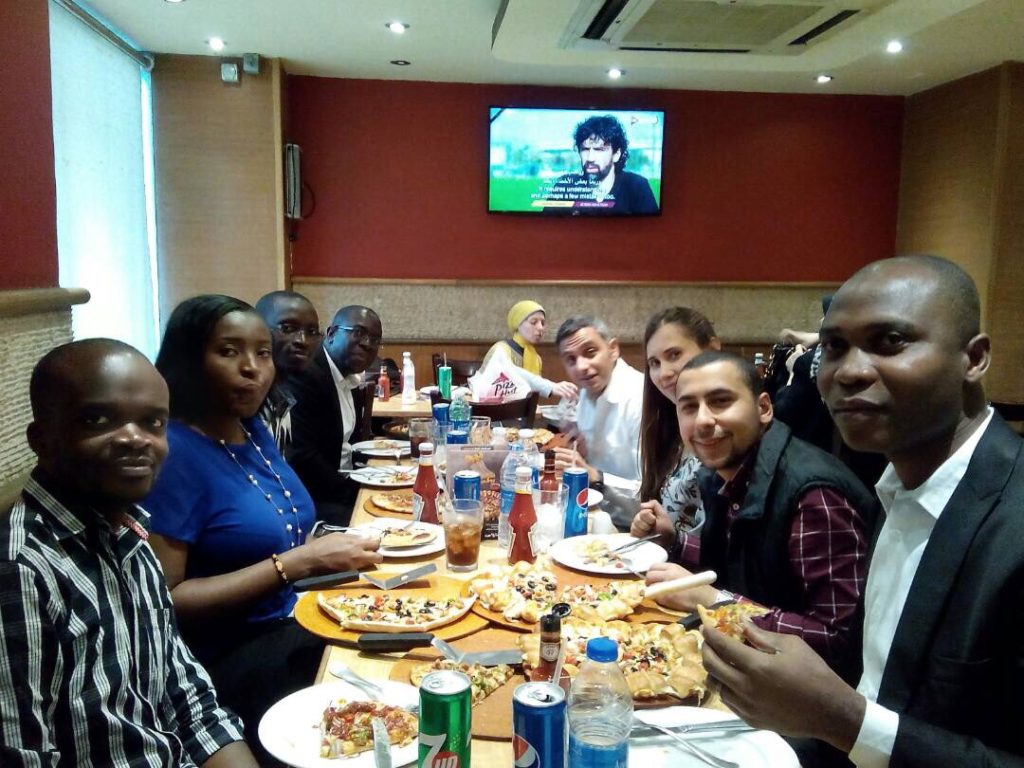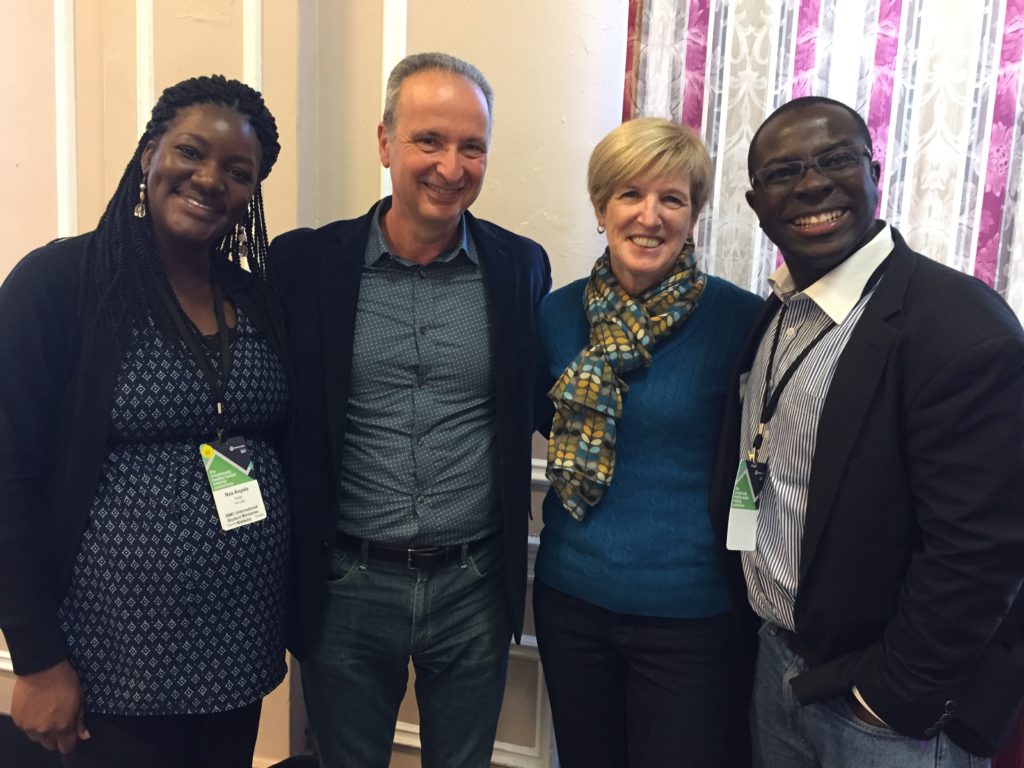COVIDic Times: A WAKE-UP CALL.
By
Dr. Owusu Banahene
At a time when for once leaders of a developing country cannot escape the infrastructure and systems they might’ve failed to build to benefit from someone else’s in the developed world, this presents a fine opportunity to experience the harsh reality for themselves and sit up, post COVID-19. A pandemic is a terrible thing to waste.
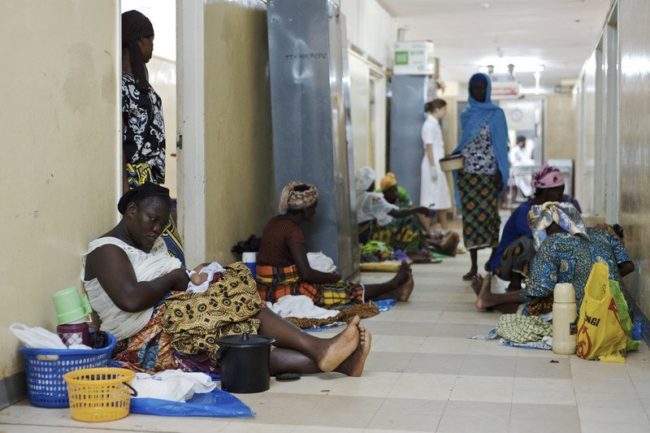
An already overstretched Ghanaian hospital pre-COVIDic times (Photo Credit: Prime News Ghana)
I would like to add my voice to concerns that some have have expressed recently about lessons that Ghana should draw from the coronavirus pandemic. This is crunch time for us. It is a wake-up call. There is no doubt that the health system in Ghana would not cope if we were to be faced with even a quarter of the cases that we have seen in countries like China, South Korea, Iran, Italy and Spain, to name but a few. Even Italy, with one of the best health systems in the world, cannot cope. The UK has adopted drastic measures because it recognises that its National Health System cannot handle the expected cases. Equally, the USA does not have enough test kits, ventilators, hospital beds, doctors, nurses etc. to manage the numbers expected.
Ghana’s health system is nowhere close to these countries. Even under normal circumstances, our public hospitals have low capacity—we struggle with shortage of beds, with many patients sleeping on the floor or in corridors. We cannot even deal with Malaria nor vaccines without going cup in hand to the Global Fund and GAVI. Yet, our politicians and governments over the decades have lived and continue to live in largesse. For example, for a small, debt-ridden, low middle income country like Ghana, we have well over 100 ministers, most of whom live in expensive houses in posh neighborhoods provided by the state and drive expensive cars (so-called V8s). Their favourite car, the Land Cruiser, costs about USD 135,000 to buy new. All of these ministers have two or more cars provided by the state.
It is not just ministers. I have seen parliamentary delegations travelling abroad, sometimes about 15 of them. They travel in Business Class. When you engage them in conversation, they tell you about some of their other trips to places like South Africa, the UK, Kenya etc. One gets the impression that they travel frequently and regularly. They get significant per diems on these trips and stay in expensive 4-star and 5-star hotels. I recall one such delegation on a trip to the UK, made up of MPs from the ruling party at the time and the opposition, not to mention their escorts. Most were in First Class, whilst the rest (the escorts) were in Business. Upon arrival at London Heathrow, there was a fleet of Mercedes cars on the tarmac from the Ghana High Commission to meet and collect them. Of course they did not go through immigration and customs like the rest of us did.
Add to the above the corruption and kick-backs from contracts and other rent-seeking activities and you get an idea of the scale of the loot and largesse. In consequence, infrastructure projects such as airports, roads, hospitals, electricity etc. cost twice or more what they should, to say nothing of procurement of routine and regular supplies across the country. These monies, amounting to hundreds of millions of US dollars, end up in the pockets of the politicians, public servants and their cronies.
I could go on, but now, consider what we could have done with such monies at a time like this with COVID-19. Consider the test kits we could have bought, the hospitals we could have built across the country, the isolation wards, the ventilators we could have procured, the number of doctors, nurses and other health personnel we could have trained and retained in Ghana—with all the extravagant spending, waste and corruption of the past three or four decades! We could have been like Singapore or South Korea but, no, our politicians, public servants and their cronies have chopped and wasted the money—and continue to do so.
I hope and pray that COVID-19 would be a wake-up call for all of us. I wish some smart Alec would identify and do an inventory of all the properties and monies, including those stashed abroad, of the politicians and public servants and ask them to account for them. Those that cannot be legitimately accounted for should be confiscated and auctioned, with those monies going into a special fund for development. It is crunch time. It is time for us to wake up!
_______________
COVIDic Times: BE AFRAID.
If we peeled the pandemic panic layer by layer what would we find lies beneath—what are people really afraid of? While not wanting to spread panic is there not a place for encouraging people to “be afraid”?
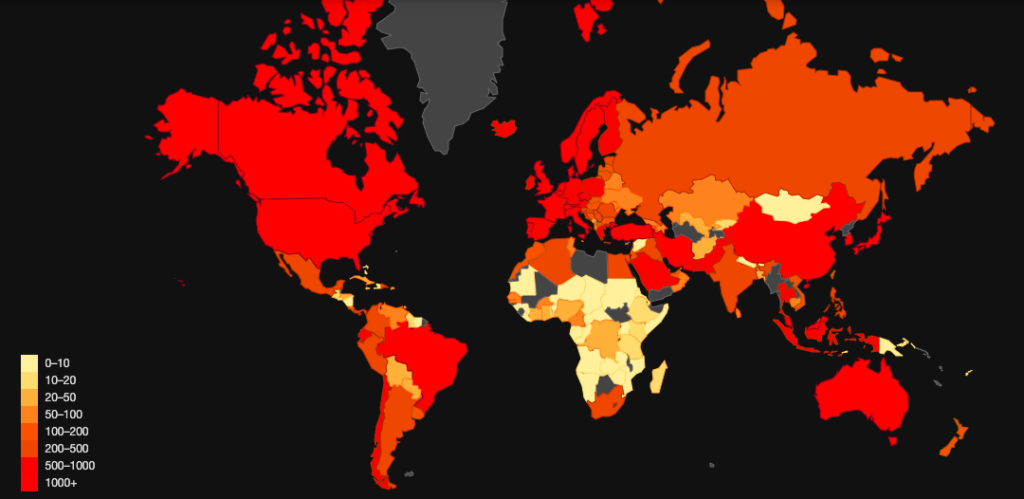
Map showing various degrees of the COVID-19 pandemic globally as of March 23, 2020 (credit: covid19info.live)
The tongue-in-cheek saying that everyone wants to go to heaven but no one wants to die seems rather apt in these COVIDic times. But really, what’s so bad about dying? Most people don’t seem to care enough about how many are recovering but rather fixated on how many are catching the disease and especially how many are dying. At the time of writing this article, the number of COVID-19 cases in the world was nearing 350,000 in 190 countries with approximately 15,000 deaths. These are not just statistics, numbers; they are real people made in the image and likeness of God, with families and friends to mourn them. May their souls rest in peace.
Much of the world is gripped in fear. But I’ve been wondering what people are really afraid of: is it getting sick per se or dying or what happens when they die? It is good to pause and ask yourself the same question, peeling back layer after layer until you find the root cause of any iota of fear that you might have/have had during this pandemic.
BE AFRAID
There have been many scripture verses and motivational messages to calm people down. This is the time preachers remind us that “there are 365 ‘fear nots’ in the Bible, one for each day of the year;” except 2020 has 366 days. Even governments have used hashtags like #SpreadCalmNotFear. While I’m of the preachy and motivational stock and have done my part to share love, spread hope, shout “fear not!” and even generate laughter amidst the virus storm I want to take a sober pause and say BE AFRAID.
Being afraid can be a good thing (or we will all do stupid things). But we ought to be afraid of the right things. It’s a good thing to be afraid to break the law, for instance, or to go after someone’s spouse. Not everyone likes Jesus Christ but no one, not even his sworn enemies, can ignore the fact that he is a real historic figure (it would be as ridiculous as saying Napoleon or Hitler never existed just because you don’t like him), was a prophet and miracle worker (two things both Christians and Muslims agree on), lived a perfectly upright life (unlike every other prophet) and teacher par excellence. Even in a raging storm (like COVID-19 has become in our day) he questioned his disciples”why are you so afraid?” while he rebuked the winds and spoke to the waves and stillness came.
In his often paradoxical pedagogy, once upon a time this teacher par excellence said not to be afraid and to be afraid in the same breath: “Do not be afraid of those who kill the body but cannot kill the soul. Rather, be afraid of the One who can destroy both soul and body in hell” (Matthew 10:28). What did he mean?
DEATH ISN’T WHAT YOU THINK
The new Coronavirus named SARS-CoV-2 that causes the disease COVID-19 can kill the body (your hardware). Ask Italians; 5,500 of them hav died already (at the time of writing). But it cannot kill the soul (your software). Yes, death is “the permanent ending of vital processes in a cell or tissue” or “cessation of all biological functions that sustain a living organism,” and that is good Biology, but death is more than that (according to ‘Soulogy’).
Many equate death with total annihilation. In other words, that once a person dies they just finish; disappear into thin air. C’est fini. That’s it. But no. Death actually means separation. Or as Finis Jennings Dake would put it, “a cutting off from realizing God’s purpose for which he was created. One can logically substitute the word separation for death in every scripture where it is used” (Dake 1991, 619). Consequently being tripartite beings–made up of spirit, soul and body–there are three kinds of death:
1. Physical Death–this is when your spirit and soul (inner man) are separated from your body (outer man). That is where biologically all functions, including brain function, that sustain a person cease permanently, from the micro (cellular) level to the macro (systemic) level. This separation of the soul and spirit from the body is the kind that as a medical doctor I would sometimes (unfortunately) be called upon to confirm: no breathing, pulse not palpable, dilated pupils not reacting to light etc. This physical death is what most people think about when it comes to the subject or our mortality, especially in these COVIDic times. But there is more.
2. Spiritual Death—this is the temporal separation of your spirit and soul from your Source/Maker/God. Or as evangelists like the late Billy Graham would plainly put it, separation of man from God because of sin. According to a Biblical worldview, the moment our forefathers Adam and Even sinned against God in the Garden of Eden, at that very moment (as promised by their Maker) they died. As a little boy I always used to wonder whether God lied about them dying as soon as they ate the forbidden fruit because they were very much alive after that, even running away from God! Now I know that what happened to them immediately was death alright–they were instantly separated from God—spiritual death. Their physical death came later. Hopefully, this makes us understand why since we as Homo sapiens are all descended from that first couple, all of us have inherited the spiritual genetic disease of sin and are born dead. Everyone of us is born separated from God spiritually, thanks to the pandemic from the virus SIN-00.
Paul puts it this way in his letter to the Christ followers in first century Rome: “for all have sinned and fall short of the glory of God” (Romans 3:23). He follows up with the consequences of this, three chapters later: “For the wages of sin is death, but the gift of God is eternal life in Christ Jesus our Lord” (Romans 6:23). Logically, therefore, if we are all sinners by nature and the salary for sin is death then we are all the living dead, from pope to prisoner, separated from our Maker.
3. Eternal Death—this, finally, is being separated from God forever in the lake of fire (hell). This, in scripture, is sometimes called “the second death” because follows “the first death” (physical death). Unlike spiritual death, this is eternal, forever. But eternal death is not entirely unavoidable. This will only happen to those who continue to live in their state of spiritual death until they physically die or Jesus Christ returns. If you remain in your state of spiritual death and you physically die you will eternally die. But there is a big IF because Paul again says that inspite of our state of spiritual death, “But God demonstrates his own love for us in this: While we were still sinners, Christ died for us” (Romans 5:8). God doesn’t just have love; God is love. He does not want anyone to be a victim of eternal death. “For God so loved the world that he gave his one and only Son, that whoever believes in him shall not perish but have eternal life. For God did not send his Son into the world to condemn the world, but to save the world through him.” (John 3:16-17)
Those who hear about Jesus Christ and believe in him as the Son of God who came to die in our place—beyond being a mere historical figure, prophet and miracle worker, righteous man, and great teacher as introduced above—receive his life in exchange; for the only reason he died as a perfect, sinless man was as a sacrifice for you and me. He died a temporal physical and spiritual death he did not deserve in order that you and I could receive eternal life rather than the death sentence on us because of our sinful nature (plus our own sinful deeds on top of that). To the legal luminary Paul, “If you declare with your mouth, “Jesus is Lord,” and believe in your heart that God raised him from the dead, you will be saved. For it is with your heart that you believe and are justified, and it is with your mouth that you profess your faith and are saved“ (Romans 10:9,10).
HOW TO NEVER DIE | THE CURE
So back to COVID-19, fear and Jesus. There is a virus (SIN-00), infinitely more dangerous than SARS-CoV-2 because it has eternal consequences, that has caused a spiritual pandemic with a manifestation of physical brokenness for thousands of years. Jesus Christ says do not be afraid of SARS-CoV-2 and its resultant disease COVID-19 which can kill the body (physical death) but cannot kill the soul (spiritual and eternal death). Be afraid of (or have deep reference for) the One who because of SIN-00 will at the end of the age, as a result of your own choice not to accept the free gift of eternal life, hand you your eternal ticket to a place of eternal separation from Him. I think inasmuch as the fire described in hell is horrific, the real penetrating eternal pain is the forever separation from Love—for God is Love. This is eternal death.
Who doesn’t like cures? Imagine it were announced today that there was now a definitive cure for COVID-19, not just the Chloroquine being experimented with now! How quickly people will line up for it! Well, let me tell you how to never die, COVID-19 or not.
One day a friend of Jesus called Lazarus physically died (you may read the story here). When Jesus arrived at the scene four days later he uttered to his sister one of the most amazing words ever spoken: “I am the resurrection and the life. The one who believes in me will live, even though they die; and whoever lives by believing in me will never die” (John 11:24-26). Understanding the three kinds of death finally allowed me to make sense of this profound scripture: the one who believes in Jesus will eternally live even though they may physically die; and whoever has overcome spiritual death (lives; now has eternal life) by believing in Jesus will never eternally die!
Then Jesus asked Martha, sister of Lazarus, “Do you believe this?” Her response was “Yes, Lord.” And she elaborated further, “I believe that you are the Messiah, the Son of God, who is to come into the world.” May I ask you too: “Do you believe this?” If not, be afraid.
Reference
Dake, Finis J. 1991. Dake’s Annotated Reference Bible. Lawrenceville, GA: Dake Bible Sales Inc.
POST SCRIPT
For those not in my social media circles you wouldn’t know just how much faith, hope and love I’ve been pouring onto the world. I feel the global body of Christ has been very pastoral in this COVID-19 pandemic (much needed, of course) but we ought not to forget our other hand/arm to be evangelistic as well.
It was at the third Lausanne Congress on World Evangelization, Cape Town 2010, that I heard for myself John Piper passionately proclaim the two truths with such wisdom and clarity: “…could the evangelical church say—we Christians care about all suffering, especially eternal suffering? I hope we can say that. But if we feel resistant to saying “especially eternal suffering,” or if we feel resistant to saying “we care about all suffering in this age,” then either we have a defective view of hell or a defective heart” (emphasis mine). Full script and video here.
God help Christ followers balance being pastoral and being evangelistic at this time; ambidextrously handling the rod and staff; flying with both wings of social concern and evangelism, “two wings of the same bird” for the blessing of all peoples of all nations and to God’s glory!
COVIDic Times: Don’t Pitch Faith and Science Against Each Other!
It’s never a good time to pitch religion and reason against each other but certainly not in a time of crisis, especially the kind of COVID-19 pandemic which requires “all [washed] hands on deck!”
Much of my time this morning was spent going back and forth debating on my Achimota School 1995 WhatasApp platform because one member forwarded what was purported to be a Tweet from a prominent Ghanaian journalist: “A country that invests in a $100 million cathedral, and not in medical research, can only pray in times of a global pandemic and hope to profit from the labs of countries that invest in science and technology.”
BLOW AWAY THE CHAFF
The last thing we want to be doing at this time is to pitch faith and science against each other, but before delving into that let me first quickly get rid of the disingenuity of the above statement which seems smart, even sassy, at face value. 1. The $100 million (if that is even accurate) is being raised by a Ghanaian Christian community that for the last 200 years has invested heavily not only in the faith of the Ghanaian people but in agriculture, schools, hospitals (including these supposed medical research centres) and the like. The government of Ghana isn’t raising the money for the cathedral–they gifted the land and seed money as their contribution but the body of Christ in the nation is doing the rest. 2. As I’ve stated elsewhere, nation building is complex: “We are building a nation here, a cohesive entity that must have spirit; not just a conglomeration of social services!” 3. Many of these countries that are being touted today as having ‘rather’ invested in science and technology have a rich faith heritage and foundation, including national cathedrals, that was part of the tide that raised them to where there are. Today they are becoming so secular to the point of amnesia! They ought to remember the rock from which they were hewn! 4. Throwing in a thorny issue at a time of national and global crises when the last thing we need is polarization is just not on; quite insensitive, actually. 5. To say one “can only pray in times of a global pandemic” is not only condescending and treating faith with disdain but unnecessarily pitting it against reason, faith and STEM. The last point is what I want to dwell on for the rest of this blog.
DOUBLE POWER
My immediate response to the said journalist’s statement is: The opposite is true also. A country that does not invest in the spiritual wherewithal of her people can only rely on science and technology, which evidently aren’t enough in the face of monstrous situations like the COVID-19 epidemic! Today, amidst the Coronavirus pandemic, doctors and scientists are using words like “hope,” “faith” and “pray.” Prayer is powerful; ask how I know!
Perhaps I’m in a unique position to speak to this issue as I am a medical doctor myself and a preacher. Double power! I prescribe medication but I also pray for people. Double power! The secular humanists only has science/technology; I have faith and science/technology. Double power! Why would anyone want to use only the right or left brain; one hand/leg instead of both (if they have them)? Why would any bird want to attempt to fly with only one wing? Why pitch faith against science when the same Lord God made both and wants everything in us and His world to be used for His glory? Double power, friends! That’s why I like the painting above that admonishes us to “wash and pray.” “Faith without works is dead,” said the apostle James. As my reverend minister likes to say, “Trust in God and lock your car.” God does miracles (the supernatural) on occasion and has also given us a bunch of principles for daily (natural) living.
Check out the double power response of Martin Luther (the Reformer) to one Rev. Dr. John Hess in a letter “whether one may flee from a Deadly Plague.”
FALSE DICHOTOMY
I have watched with amusement as various world leaders respond to the COVID-19 crisis. Again, I may be in a unique position in experiencing both ends of the spectrum as a Ghanaian (largely religious) and Canadian (largely secular). Within the same 24 hours, the Canadian Prime Minister (whose wife has tested positive and who is himself in isolation) made a broadcast admitting he was as flustered as everyone else but generously offering practical measures to curb the debacle, the Ghanaian president called a number of church denominational leaders to the seat of government (Jubilee House) to pray! I am one of the 13,000 who joined in that prayer meeting via FaceBook Live and I loved his opening remarks. He said (to paraphrase), yes we have put health measures, travel advisories, financial resources etc. in place but we need more–to call on the God of Heaven as other leaders and nations have done throughout history and even now (we know the United States presidency also called for a national day of prayer on Sunday March 15). The Ghanaian president’s kind is an endangered species, one of few in the modern world who do not separate the physical and spiritual realms.
Consider Myers’ table above. How did we get here, to a place where the modern worldview is so dichotomous?! Pitching faith and reason against each other goes back centuries, perhaps peaking during the Enlightenment (17th to 19th century) in Europe. Yet we forget that Newton, Kelvin, Faraday and a host of other scientists were people of faith, specifically of the Christian faith. Does one’s faith make them a better or worse scientist? Of course not all scientists have faith–such is the beauty of the free will of humankind.
CONCLUSION
Faith leaders, this is not a time to be playing down rigorous reasoning and true science (for o yes, there is such a thing as pseudoscience) and flouting the basic public health protocols provided. Secular leaders, this is not the moment to look down on people of faith–who knows, their prayers may be keeping you alive!
I am right-handed but would hate to be only one-handed! I am a person of faith and reason, science and religion. I admit that Truth tends to be paradoxical and managing the tension between two ends isn’t a comfortable place to be but I’d rather fly with both wings than attempt to soar on one alone–impossible! Again, let’s not fall for the tyranny of the ‘or’ but embrace the genius of the ‘and’ (Jim Collins). Wash your hands and clean your hearts. Social distancing doesn’t imply spiritual distancing. Pray hard as if everything depended on God (it really does!) and work hard (especially those of us on the medical frontlines as well as in the background slaving away in labs trying to make vaccines) as if everything depended on you (humanly speaking, it does).
In many things, our world is polarized: female versus male, poor versus rich, secular versus sacred, spiritual versus material, church versus state, private versus public, evangelism versus social action… Please let’s not add science versus faith, especially in this time of crisis!
Reference
Myers, Bryant L. 2011. Walking With the Poor: Principles and Practices of Transformational Development. Maryknoll, NY: Orbis Books.
A Painful Thought
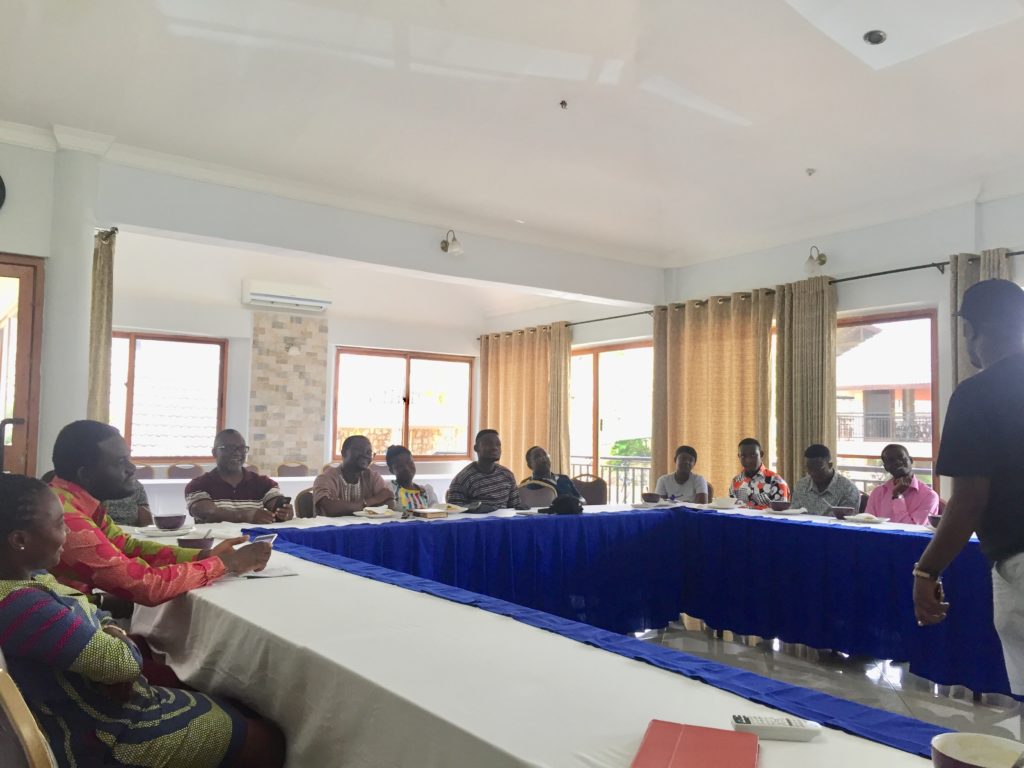
Andragogy (adult learning) and Pedagogy (teaching children) are miles apart
When I attended the University of Ghana Medical School (UGMS) I always thought the posture of most of my lecturers and professors was not only authoritative but even rather condescending. Now I know why. We were not exactly ‘kids;’ in fact, some of us were even married and such, and yet one of Knowles’ six core adult learning principles (Knowles 2015, 6)—prior experience of the learner—was being violated again and again.
Contrary to Lindeman’s foundation that “the resource of highest value in adult education is the learner’s experience” and that “experience is the adult learner’s living textbook” (20) we were rather treated as neophytes with not only nothing in our heads but nothing in our hands to offer either. I have been wondering whether any of the designers of our curriculum knew, considering their ‘sage on stage’ approach and ultimate ‘punishment’ of examinations that “authoritative teaching, examinations which preclude original thinking, rigid pedagogical formulae—all these have no place in adult education” (20).
Considering how deeply wounded my medical education experience has left me, and now understanding why from the principle of “prior experience of the learner” being violated, I resolve never to treat any adult learner the way I felt mistreated in my future design of educational programmes.
Taking the advice of Lindeman, this principle implies that in programme and/or lesson design “none but the humble become good teachers of adults” (21). It is a beautiful thing to see the experience of the adult learner esteemed so highly, even at par with the teacher’s knowledge! “In an adult class the student’s experience counts for as much as the teacher’s knowledge. Both are exchangeable at par. Indeed, in some of the best adult classes it is sometimes difficult to discover who is learning most, the teacher or the students” (21-22). Wow!
Reference
Knowles, Malcolm, et al. 2015. The Adult Learner: The Definitive Classic in Adult Education and Human Resource Development. San Francisco: Jossey-Bass.
A Daniel Dare for the New Year
With another new year comes another fresh challenge of fasting and prayer for 21 days—just like Daniel did.
HARD TO BEAT
Make no mistake. Every excuse you may have not to fast and pray, Daniel had same and more. He was super smart, highly intellectual and well-trained—from Alchemy to Zoology (Daniel 1). He aced the national test to serve the king.
He was super gifted with insight to interpret dreams, mysteries and hard puzzles that baffled the most sophisticated magicians, enchanters, astrologers and diviners of his time—in fact, he was once appointed chief of them all in King Nebuchadnezzar’s era (Daniel 5).
Daniel was super busy—he was one of three senior ministers overseeing 120 regional ministers of the Babylonian kingdom—he wasn’t slack. Indeed, Daniel so distinguished himself among the ministers and senior ministers by his exceptional qualities that the king planned to set him over the entire kingdom as prime minister (Daniel 6).
He was super principled and ethical—his diet, motives, honesty, disciplines, integrity, convictions… He was a man of noble character. He served several successive kings—he outlasted them—even as an immigrant in high political office.
Super young, super good-looking, super liked and all the above, he still found the need to fast for 21 days, seeking understanding of an issue that he wanted to unravel. At that time I, Daniel, mourned for three weeks. I ate no choice food; no meat or wine touched my lips; and I used no lotions at all until the three weeks were over. (Daniel 10:2-3)
If you are satisfied with being super by earthly standards, then by all means forget about the pain of fasting and the work of prayer. But if you want to see the supernatural intervening in your earthly matters, then welcome to the school of fasting and prayer.
DO THE MATH
Every new year is a mystery, like Daniel’s, waiting to be unravelled. To take 21 days seeking audience with the Author, Executor and Perfector of all the 365 days laden with prospects and dangers is only a 6% investment of your year but worth 100% of the effort.
Since 2007 a number of us have done this math and figured an exciting time of seeking the Lord in 21 Fasting Days of Prayer, Purpose and Planning at the start of each year is so worth it. See my blog last year for some of the most important reasons why I personally do this year after year for over 10 years now!
Please plan to join us as we seek the Lord in fasting and prayer from January 2nd to 22nd. We will plan to meet together daily for corporate prayer times in person or via video call (Zoom) from 5 pm to 6 pm local time (wherever you are in the world) and 5pm to 6pm ET in North America in particular. You will find the meeting link and schedule of daily prayer topics below.
CHOOSE YOUR FAST
In fasting, we commit to denying ourselves of food, drink or other comforts to more fully focus on prayer and fellowship with God. There are many types of fasts. There are complete fasts where you deny yourself all food or partial fasts where you forego certain types of food. Food is anything with calories 🙂 so does not include water (which has zero calories). It is actually a healthy practice to keep hydrated since the body is 60% water. A dry fast (no water) isn’t recommended beyond three days. Usually, when people set out to fast for an extended time—like the 21 days in the Daniel Fast—they will choose to do a partial fast.
The Daniel diet during this fast (like he did) is mainly vegetables and denying yourself meat, drinks and other choice foods. Basically, nothing fancy. Some still have three meals a day but nothing fancy (as described above) while others go the whole day denying themselves breakfast and lunch and eating only in the evenings.
Here are three suggestions of different partial fasts you could choose this January:
1) Full day fast Type 1: Fast from breakfast and lunch and eat a normal supper in the evening for the 21 days.
2) Full day fast Type 2: Fast from breakfast and lunch and eat a Daniel fast supper in the evening for the 21 days.
3) Fast Type 3: Eat three Daniel Fast meals each day for 21 days.
Please prayerfully consider joining us for this exciting 21 fasting days of Prayer, Purpose and Planning for 2018!
LAND THE DEAL
“Do not be afraid…Since the first day that you set your mind to gain understanding and to humble yourself before your God, your words were heard, and I have come in response to them. But the prince of the Persian kingdom resisted me twenty-one days…Now I have come to explain to you what will happen to your people in the future, for the vision concerns a time yet to come.” (Daniel 10:12-14)
It is the same dude, Daniel, who was unequivocal in stating, “…the people who do know their God shall be strong, and do exploits” (Daniel 11:32b). Now you know. HAPPY NEW YEAR!
TECHNICAL INFO
Schedule: January 2-22 daily topics here
Zoom Link: Join from PC, Mac, Linux, iOS or Android
Or Telephone: US: +1 646 876 9923 or +1 669 900 6833 (Meeting ID: 248 246 747)
International numbers available: https://zoom.us/zoomconference?m=BWpwOmbBqIO9McEisO8aYDJSSz5Wzav_
Emotionally Constipated
In medical school this wasn’t one of the diagnoses I was taught I could make but on the other side of the doctor’s desk, this may be an even more dire diagnosis than a clogged gut.
MAINLY MEN; BUT NOT ONLY
Last Sunday, in a suburban church in Montreal, this was the summary of the middle-aged chap who shared his life-long struggle of dealing with his past: “I don’t do emotions.” Me too! Well, no more.
In many world cultures, that is the manly thing to do; it is macho. Some women try it too 🙂 In fact, in my own language, there is a saying that, “Obarima nnsu;” to wit, real men don’t cry. Even as a little boy growing up in Scripture Union circles in Accra, I always knew there was something wrong with that statement because I considered no one more manly that Jesus Christ yet he wept. Ever since then, I haven’t had a problem with weeping (you probably have seen me weep!) but errm… not done so well with a whole range of other emotions.
FACE, FIGHT OR FLIGHT?
I still remember my rather unemotional response to one of my staff’s emotional appeal when he said, “I feel…” My immediate response was, “Good thing that it’s only a feeling; but what do you think?!…” I don’t need to tell you that conversation didn’t go very well after that.
The Lord has been particularly convicting me of my emotional immaturity since the beginning of this year. Prior to that, I was the kind of leader Ruth Haley Barton would describe in Parker Palmer’s words as having risen to leadership based on “extroversion, which means they have a tendency to ignore what is going on inside themselves. These leaders rise to power by operating very competently and effectively in the external world, sometimes at the cost of internal awareness… but the link between leadership and spirituality calls us to reexamine that denial of the inner life.” (Barton 2012, 44, emphasis mine).
In fact, I might never have picked up a book like Peter Scazzero’s The Emotionally Healthy Leader because hitherto the word ‘emotional(ly)’ anywhere put me off. But for Dallas Willard and Scazzero, I had never thought of my emotional life as specifically needing to be discipled! I certainly did not have the theological, mental or practical framework for that!
Scazzero astounded me and totally destroyed my perception of what spiritual formation consists of when he emphatically stated, “it is not possible to be spiritually mature while remaining emotionally immature!” (Scazzero 2015, 17). Gordon Smith drove the dagger deeper into my heart when he confirmed that “what is happening to us emotionally is not secondary to our spiritual experience, but may actually be—pun intended—the heart of the matter” (Smith 2014, 27).
And whole squadrons of the ancients agree, that “few things are so crucial to our growth in faith, hope and love as our capacity to be alert to the emotional contours of our lives” (28). Smith then adds another dimension, that not only are my emotions an area to be discipled for sure but they are also indicative, a dashboard sign, in the sense that “the depth of our hearts reflects the depth of our emotional lives; nothing so captures the inner recesses of our beings as what is happening to us emotionally” (28). In fact, St. Ingatius exhorts that we check for feelings of consolation and desolation in the Examen.
For all those as emotionally constipated as I used to be, we need to decide now: are we going to face our emotions, fight them or flee?
DENIAL, DISTORTION & DISENGAGEMENT
I could give myriad reasons (in addition to the couple above) why being emotionally aware and emotionally expressive in a healthy way is non-negotiable in life and leadership but just take a moment to consider why Dan Allender and Tremper Longman, in The Cry of the Soul, find this paramount:
“Ignoring our emotions is turning our back on reality; listening to our emotions ushers us into reality. And reality is where we meet God…. Emotions are the language of the soul. They are the cry that gives the heart a voice…. However, we often turn a deaf ear—through emotional denial, distortion, or disengagement. We strain out anything disturbing in order to gain tenuous control of our inner world. We are frightened and ashamed of what leaks into our consciousness. In neglecting our intense emotions, we are false to ourselves and lose a wonderful opportunity to know God. We forget that change comes through brutal honesty and vulnerability before God.”
THE DOCTOR’S DOCTOR
So where do we go from here? Personally, I have not only devoured Scazzero’s The Emotionally Healthy Leader but also led my entire ISMC national leadership team and still taking the fourteen country CEOs of The HuD Group through it chapter by chapter. At ISMC’s recent biennial national staff conference in Montreal, there was a daily ‘Emotionally Healthy’ segment (spirituality, relationship, leadership). In fact, the picture you see above was taken in May 2017, when Anyele and I had the privilege of joining the authors, Peter and Geri Scazzero, at their conference in New York (together with the CEO of The HuD Group Canada and his wife). I’m still learning and eagerly walking with a few others through Emotionally Healthy Spirituality over the next few months.
Having gleaned from Smith that “the genius of good [spiritual] direction is that we probe together, director and directee, and attend to the emotional wake that is left by the myriad of experiences we have had or are having” I have begun a search for a well-fitting spiritual director, apart from the amazing mentors, accountability partners, counselors and coaches I have in my life. And a good practice, encouraged by my wife, has been to “name my feelings,” because “what you name you can tame.”
How about you? Could you too be suffering from emotional constipation? What may God be calling you to do about it? Take a personal Emotional Healthy Spirituality assessment here. Don’t be afraid or ashamed to admit your state of emotional immaturity or bankruptcy, because hey, “God blesses those who are poor and realize their need for him, for the Kingdom of Heaven is theirs.”
Other Works Cited
Barton, Ruth Haley. 2012. Pursuing God’s Will Together. Downers Grove, IL: IVP.
Scazzero, Peter. 2014. Emotionally Healthy Spirituality Day by Day. Grand Rapids, MI: Zondervan.
Scazzero, Peter. 2015. The Emotionally Healthy Leader. Grand Rapids, MI: Zondervan.
Willard, Dallas, 2002. Renovation of the Heart: Putting on the Character of Christ. Colorado Springs, CO: NavPress.

